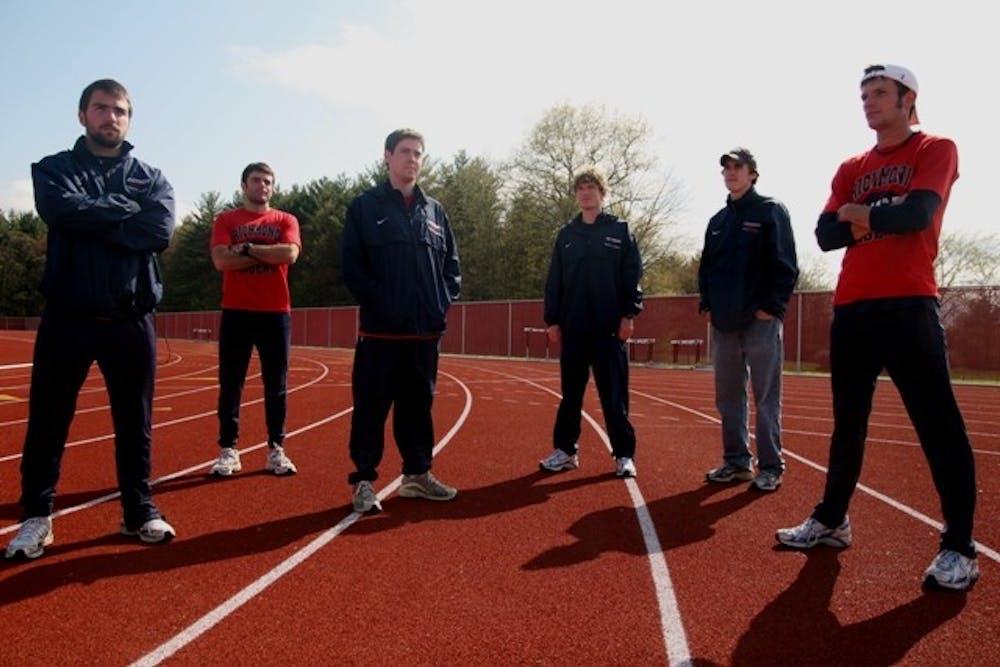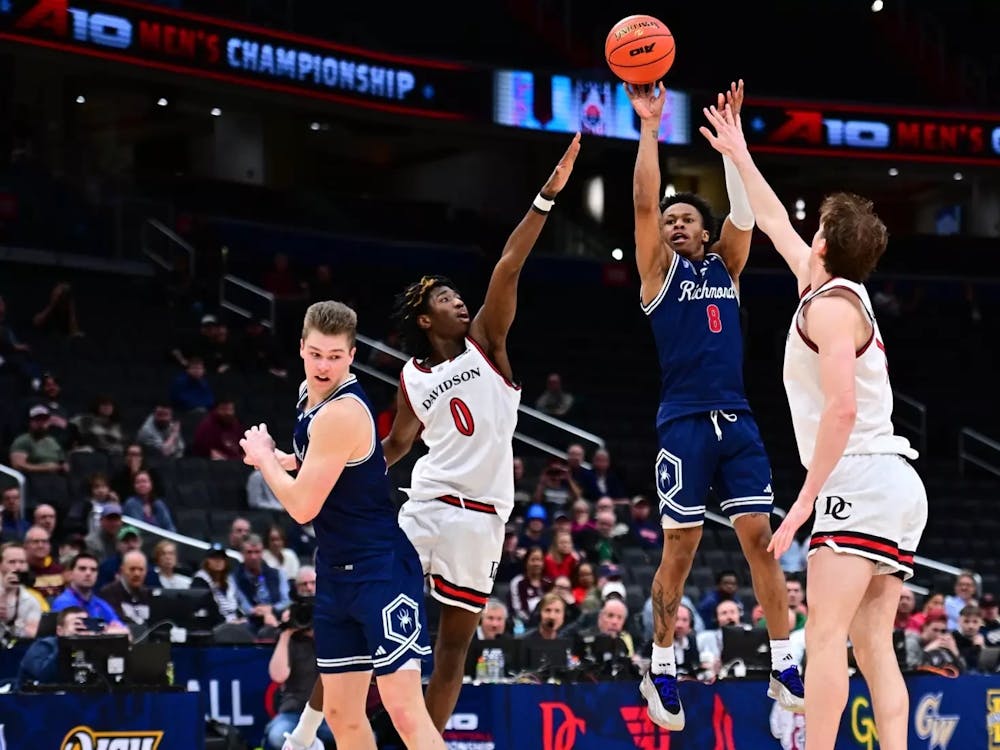In the fall of 2004, the University of Richmond men's track and field team consisted of two upperclassmen and a wideeyed group of freshmen. At the Atlantic 10 Cross Country Championships, the Spiders could barely field a team; competing with seven racers, four of whom were freshmen.
This fall, the men's track and field team consisted of 30 athletes competing in events ranging from distance to long sprints to the javelin throw. At this year's A-10 Cross Country Championships, that same wideeyed group of freshmen -- now confident, established seniors -- led the Spiders to a second-place finish.
The team's performance put Richmond track on the map and provided this year's senior class -- an embattled group of young men who have endured more than their share of adversity -- a satisfying and somber end to four long, fulfilling years.
"They definitely are special," the team's head coach Steve Taylor said. "I've never been around a group like this in 20 years of coaching."
Taylor, along with his wife, women's head coach Lori Taylor, have coached the Spiders since 2002 and have watched this senior class develop and improve during the years.
"It's been an honor and a privilege watching this group come together, work hard and succeed," Taylor said.
That work ethic and drive for success was instilled in this group as freshmen by then-junior distance runner John Ciccarelli. "When we came here to the program, that was it," said senior distance runner Pete Norquist. "We had us and John Ciccarelli. That was our team."
In December 2006, Norquist underwent open-heart surgery to repair a leaky valve. Though he still practices and runs with the team, Norquist has not competed since a month before the surgery.
Norquist's teammate and close friend, senior Brendan Regan, said Ciccarelli had inspired the young team to work hard and really commit to Taylor's arduous training regimen. "Coach's philosophy is Callus the mind, Callus the body," Regan said. "We're up for practice every day at 7 a.m. I wouldn't change a thing, but it's a much different style of living than the average college student.
Taylor said Ciccarelli had been instrumental in getting the freshmen to work through his system.
"It's a tradition," Taylor said. "The self-discipline, the work ethic, the study habits, everything. The coach can present it, but it's up to the team to embrace it and with [Ciccarelli's] leadership they really took it and kept it going."
Along with Norquist and Regan, that freshman class included distance runners Mike Stubbs, team captain Jon Molz, Ryan Jobes and Hunter Willis, as well as javelin thrower Neil Slotterback.
Enjoy what you're reading?
Signup for our newsletter
The group became close very quickly, bonding over early morning workouts and seemingly endless training.
"We all lived together in one corner of Freeman [Hall]," Norquist said. "We stuck together because our lifestyle was so much different than everyone else's."
Following Ciccarelli's lead and Taylor's method, the young team began to improve and attracted top recruits for the following year, despite being the school's only non-scholarship varsity athletic team.
"This group really helped in the recruiting process," Taylor said. "We've got a tremendous group of freshmen and sophomores that are directly connected to this group."
In the midst of the team's success came tragedy. In the winter of 2005, the group -- then sophomores -- lost one of its own. On Dec. 20, 2005 Jobes was killed in a car accident on his way home for winter break. News of Jobes' death was shocking for the rest of the team and has left a profound void.
"I got a call at home from coach with the news," Norquist said. "I still remember every detail. It was easily the worst thing that's ever happened to me."
Regan shared that sentiment with Norquist.
"Someone tells you your best friend died; I don't know how you deal with that," he said. "I will say that having this network of guys on the team really helped a lot, but when [Jobes] left us that's something you can't make up for in any way.
"As college kids we all think we're invincible, especially when you're a runner. Ryan was someone who really understood that idea of enjoying every moment."
Stubbs said that since his death, Jobes had been on his mind during every race.
"It took a toll on us," Stubbs said. "It was tough. There's just a very noticeable gap on our team."
Following Jobes' death, the team set up the Ryan Jobes Memorial Run-a-Thon in order to help support the Ryan Jobes Scholarship Fund, set up by Jobes' parents in 2006.
Molz said the team found out about Norquist's surgery while at the first memorial run in December of 2006, about a year after Jobes' death.
"We lost people two years in a row," he said. "Both were around Christmas time.
"We start dreading going home for holidays because we don't know who's going to be back after the holidays."
Taylor, who has a plaque hanging in his office commemorating Jobes, said this group of men had been deeply hurt by their friend's death but that the memory of his life had inspired them to continue to work and dedicate themselves to running and to each other.
"There's not a day that passes that Ryan doesn't come up in conversation or in thought," Taylor said. "It's going to impact them for the rest of their lives. They are all better people from his loss. No one has forgotten nor will we forget Ryan."
Ryan's sister, Kristen, is a freshman at Richmond. On April 12, the team gathered with the Jobes family to celebrate Ryan's birthday. He would have been 22 this year. Adding to the team's misfortune were several health issues.
Last year, Regan was diagnosed with plantar fibroma, a non-cancerous tumor, on the arch of his right foot. Despite one doctor's advice to never run competitively again, Regan worked out a specialized training system with Taylor and has continued to compete.
"I've definitely had a very rocky college career," Regan said. "My goal is always just to stay healthy. Coach has been very positive."
On April 1, Stubbs was diagnosed with an anomalous right coronary artery. His surgery was scheduled for today in Boston and he said he hoped to be back in Richmond in time for graduation.
"Our team has been through hell," Stubbs said. "With injuries and whatnot we've just had to deal with a lot of adversity." Molz said he had been shocked to hear Stubbs needed surgery.
"You think it can't possibly happen again and now we're two weeks away from graduation and one of our own is going in for major surgery," he said. "You never get used to these things."
Despite the hardships and losses, the team has continued to work. This fall, the Spiders -- led by their senior distance runners -- finished second in the A-10 Cross Country Championships, beating out scholarship programs and establishing Richmond as a viable contender in Division I track and field.
"We have a fantastic team," Norquist said. "Taking the six of us and turning us into legit D-I runners, it says a lot about Coach Taylor. I'm just so happy we were able to advance the program. We've established Richmond now as a force."
With this group graduating, Taylor said he believed the dynamic of the team would change.
He also said that -- like John Ciccarelli before them -- this class had made sure to support his coaching philosophy and instill the kind of work ethic in the younger classes that had made them so successful.
"They've done a really good job of passing on that tradition of working hard for success," Taylor said. "They're leaving the program much better than they found it.
"We'll miss these guys and make sure to stay in touch but it's the beginning. When one chapter is finished another one is opened."
The members of this group -- Norquist, Molz, Stubbs, Regan, Willis, Slotterback -- have endured more hardship than the average college student, but rather than dwell on their misfortune, they have used it form a close bond which has made them successful both on and off the track.
"We've gone through a lot," Norquist said. "Not just the sweat, but the blood and the tears. I'm confident we'll stay in touch with each other when we get out of school. It's a bond of brotherhood."
Regan said he hoped his efforts and the efforts of his teammates had helped establish Richmond as a competitive program.
"I hope that I was part of something that made this program better," Regan said.
This group arrived on campus in the fall of 2004 following average high school track careers, but through hard work, commitment and a refusal to be beaten by adversity they helped build a competitive program up from obscurity.
"There's no quit in them," Taylor said. "They never give up. They've gone through too much already but they comprehend that this is life and they've learned to deal with it. So many people would have given up -- these guys just keep going out there"
Support independent student media
You can make a tax-deductible donation by clicking the button below, which takes you to our secure PayPal account. The page is set up to receive contributions in whatever amount you designate. We look forward to using the money we raise to further our mission of providing honest and accurate information to students, faculty, staff, alumni and others in the general public.
Donate Now



